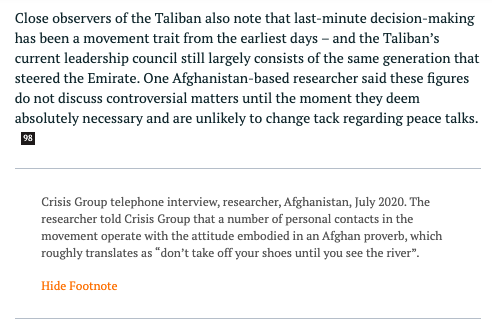
Work on Afghanistan for @USIP. Formerly @CrisisGroup, the UN, humanitarian access. All views shared are personal.
How to get URL link on X (Twitter) App

https://twitter.com/OmSamad/status/15986704439883735052/No claims yet, but timing of attack on Hekmatyar complicates speculation on attackers' intent.
https://twitter.com/JJSchroden/status/1527254902577176579If you timeline & map out ANDSF's collapse, one step at a time... WHEN large numbers of troops or whole units began to surrender or collapse, WHERE this took place, WHICH elements of the Afghan security forces all seem to play determinative factors.

https://twitter.com/amanpour/status/1526249630773690368Haqqani's framing - that women must be covered before stepping into public life - is abhorrent.
https://twitter.com/and_huh_what/status/1523412756078415872There are reports of Taliban abuse and even executions of resistance fighters and others in Panjshir, including noncombatants. This violent overreach is becoming a predictable pattern in the Taliban's response to resistance activity, across regions and different communities. /2
https://twitter.com/MadadiSaeid/status/1493234616219709444

https://twitter.com/AbdulMateenImr1/status/14196143759927582722/ By end of June, Taliban moved deep into Balkh, once most prosperous/secure province in post-2001 Afghanistan.

https://twitter.com/BRRubin/status/14149145298096005142/7 Don't miss @FrudBezhan's 2016 piece on the Taliban's expansion of their ethnic base via recruitment, which has only increased since then (I noticed he has promised to update this reportage!):


 Many in US military circles beg to continue fighting Taliban... forever. But US president wants to leave Afghanistan.
Many in US military circles beg to continue fighting Taliban... forever. But US president wants to leave Afghanistan.https://twitter.com/ForeignAffairs/status/1245541534155579392?s=20
https://twitter.com/pajhwok/status/1240914124088823809High-casualty clashes like this (or days ago in Balkh) raise question:
https://twitter.com/USFOR_A/status/1235116513629057025